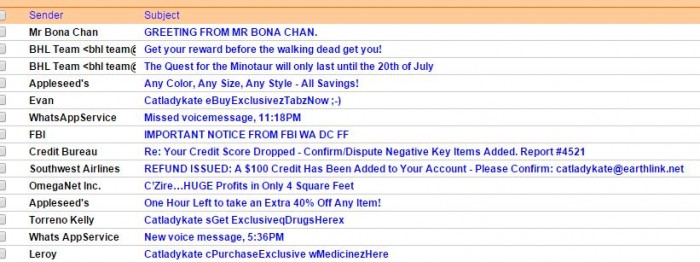So many people are so very kind, so generous to share their good fortune and best ideas with me. Mr. Jami from Ghana wants to share 16 million $$ with me. The New York Times wants me to subscribe. The supplement people want me to eat better, the drug folks want to cure toenail fungus but the Find-a-Lawyer people can’t decide whether I need to fight a DUI or get divorced.
Other kindly souls want me to enjoy a larger ahem! or find a single Christian. Of if single Christians don’t do it for me then there are single Jewish people too. And if that doesn’t work then I can go to school for a nursing certificate for FREE or get a reverse mortgage NOW.
It is really kind of these people to think of my happiness. I guess once I get Mr. Jami’s millions then the obvious next thing to do is take advantage of the divorce lawyers, then hook up with the Christian single people (or the larger Ahem! folks) and go sit on the beach with a cute young guy. So thoughtful.
Not everyone wants to give me things.
My bank debits for $5325.68 and $3296.23 did not go through and since those piddly sums didn’t concern me, the next time my account bounced $28,963.86. Huh. Maybe that will get my attention!
The opportunities are endless! What shall I pick? Riches, a larger ahem!, a new friend? Better food through chemistry, or an education? Pay off bank debts, get out of jail or cure toenail fungus?
We truly live in an era of unparalleled generosity. These friendly people only want me to be happy and their only wish is for my email, password, bank account, social security number and mother’s maiden name.
Tips To Avoid Scams
My spam filter misses 5 to 20 of these a day. Most are easy to identify:
- The text is scary. They threaten you will lose your password or go to jail or lose money.
- Fake emails from PayPal or eBay may threaten account suspension or a claim.
- They solicit money. Some will ask for cash to help a stranded relative.
- They offer money. The famous Nigerian (and now Ghanian) scams, and bogus Amazon Prime and airline vouchers do this.
- Cash amounts tend to be large and provide no information. The bouncing bank debits are good examples.
- The offer is too good to be true. (Why did Mr. Jami from Ghana pick ME?)
- The offer is illegal. (Mr. Jami needed to avoid legal problems and I doubt he planned to pay gift tax!)
- The email includes a link, a download, strange spellings and grammar
- The email uses a .IN address, as in [email protected]
- The domain name is full of strange characters, as in so-and-so@493f%*&4dfj3.com
I get email from my bank with links. Here is how I verify they are real.
- Hit reply, but don’t send the message. Examine the recipient email address. Does it match the purported sender? Click cancel.
- Hover the cursor over the link and look at the hyperlink address. If it includes an address that fits the sender then it may be OK.
- Most real emails will give directions to access the offer that do not require links. I follow those directions.
- If I get a mail about a bank payment or credit that I don’t recognize then I check online immediately – but do it by logging into my account through the normal site, not by clicking a link.
Some phishing emails are pretty sophisticated while others are LAME. Our friendly federal government has a set of tips for us you can read here.
As for me, I guess I need to turn off my dreams of avarice. Mr. Jami gave up on me!

Leave a Reply